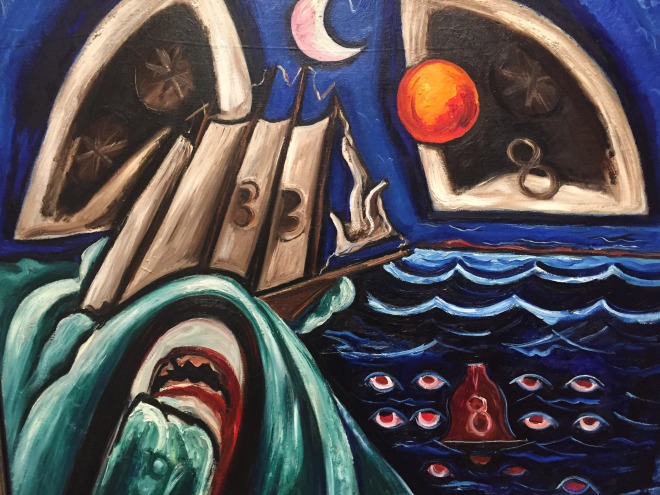
My life closed twice before its close—
It yet remains to see
If Immortality unveil
A third event to meSo huge, so hopeless to conceive
As these that twice befell.
Parting is all we know of heaven,
And all we need of hell.Emily Dickinson
At Melville’s Tomb
by Hart Crane
Hart Crane committed suicide by jumping off a boat sailing from Mexico City to New York City, his depression finally overwhelming during a prolonged period of writer’s block. Marsden had been with him in Mexico City and grieved his loss by painting an image filled with symbolism of Crane’s life and poetry.
Hart Crane was not related to Stephen Crane. Stephen died even younger at age 28 from tuberculosis and by way of hard and happier living. I am not a big fan of Stephen Crane’s parable poems. However, I think if Hart had been able to take more of Stephen’s perspective in dealing with his demons, he might have found a way through his darkest of days and not become a “shadow that one the sea keeps.”
Do you think Hart Crane’s sonnet foreshadow’s his death or was thoughts of suicide part of his subconscious mind, shaping his words as he wrote?
A Man Went Before A Strange God
by Stephen Crane (1871 – 1900)
A man went before a strange God —
The God of many men, sadly wise.
And the deity thundered loudly,
Fat with rage, and puffing.
“Kneel, mortal, and cringe
And grovel and do homage
To My Particularly Sublime Majesty.”
The man fled.
Then the man went to another God —
The God of his inner thoughts.
And this one looked at him
With soft eyes
Lit with infinite comprehension,
And said, “My poor child!”
